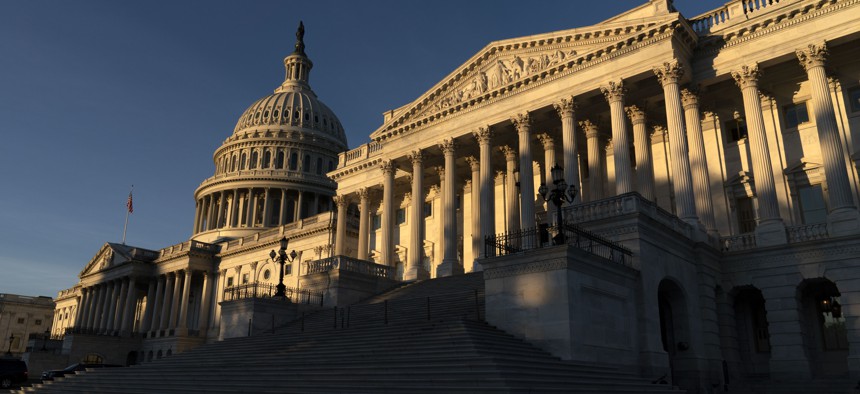Push Is On to Salvage Muni Finance Provisions Left Out of Biden Plan

The U.S. Capitol is seen in Washington, Thursday, Oct. 28, 2021. AP Photo/Jose Luis Magana

Connecting state and local government leaders
A key refinancing tool that states and localities want to see brought back, along with other proposals, didn't make the cut.
The roughly $1.75 trillion domestic spending plan President Biden unveiled on Thursday leaves out provisions that supporters say would provide state and local governments greater flexibility and substantial cost-savings when financing infrastructure projects.
In response, over two dozen groups that represent cities, counties, towns, government finance officials and public works agencies are mounting a last ditch effort to get those proposals included, sending a letter to congressional leaders after the plan's release pleading their case. But the window to make changes to the package could be tight.
One of the absent municipal finance measures would restore what's known as advance refunding for state and local government bonds. States and localities relied on tax-exempt advance refunding as a key tool to refinance and restructure debt before it was eliminated in the Republican-crafted tax law that passed in late 2017.
Also missing: language designed to increase the access small municipal borrowers have to capital, including through "bank qualified debt."
A program to revive and expand what are known as "direct-pay" type bonds—similar to the Build America Bonds launched around the time of the Great Recession—didn't make the cut either.
Provisions along these lines were included in legislation the House Ways and Means Committee marked up in September.
"There is broad bipartisan support in Congress to enhance municipal bonds for state and local governments, thereby providing a more powerful, cost-effective way to drive further investment and economic growth," the groups wrote in the letter to congressional leaders.
"We urge members of Congress to join in supporting these bipartisan provisions," they added.
The Biden administration and Democrats are trying to squeeze a raft of major programs related to education, housing and the environment into the package, while containing costs to satisfy moderate senators.
And although the municipal finance provisions could benefit states and localities, they will come at a cost for the federal balance sheet. This is why it could be difficult to get them in a final bill.
It's unclear how extensive negotiations over reworking the plan will be from this point forward.
The House is tentatively preparing for a vote as early as Tuesday on the domestic spending package and separate $1.2 trillion infrastructure legislation, multiple news outlets reported over the weekend. If the domestic spending bill clears the House, it would then go to the Senate for consideration.
Thirty groups signed onto the letter advocating for the inclusion of the municipal finance measures, including the Government Finance Officers Association, the National League of Cities, the National Association of Counties and the U.S. Conference of Mayors.
Eryn Hurley, deputy director for NACo’s government affairs department, emphasized that counties were pleased overall with many of the programs Biden's plan includes, despite the fact that the municipal finance provisions were left out.
"We were disappointed to see that," she said. "But ultimately we were very, very excited to see a number of other provisions included.”
Among the dropped municipal finance provisions, Hurley said restoring the tax exemption for advance refunding is especially important from NACo's perspective. "That has been a priority for NACo for quite some time now," she said, adding that it would help counties invest in infrastructure like hospitals and other public health facilities.
Potential Cost Savings for States and Localities
The Government Finance Officers Association estimates that between 2007 and 2017 there were over 12,000 tax-exempt advance refunding transactions nationwide that saved taxpayers and ratepayers more than $18 billion over that ten year period.
Advance refunding gave state and local government borrowers a way to issue new debt to refinance or restructure outstanding bonds more than 90 days before the those bonds reached their “call date”—a date when the borrower is allowed to pay them off.
That’s compared to a “current refunding,” inside that 90-day window. Tax-exempt current refundings are still allowed under federal law.
The advantage of advance refundings for borrowers is that they can take advantage of low interest rates available outside of the 90-day current refunding timeframe.
Interest investors earned on advance refunding bonds was exempt from federal income tax prior to the 2017 tax law taking effect. But the tax law ended that exemption, halting advance refunding in 2018.
GFOA makes a case that bank qualified bonds can reduce the costs small governments face when they issue debt, enabling them to deal with local banks that are more familiar with them than municipal market investors, and cutting down transaction expenses typically associated with bonds sales.
Under current law, governments that issue $10 million or less in bonds per year can go the bank-qualified route when borrowing. GFOA and other advocates want to see that threshold raised to $30 million.
Direct-pay bonds involve government issuers receiving subsidy payments from the federal government that help cover a share of the interest costs for the debt. Unlike other muni bonds, these are taxable.
The letter says that restoring and expanding these bonds "would immediately create an attractive investment option globally while funding thousands of state and local projects."
A Congressional Research Service report issued earlier this year noted estimates from the Treasury Department indicating that during the course of the Build America Bonds program over $181 billion of the bonds were issued.
Bill Lucia is a senior editor for Route Fifty and is based in Olympia, Washington.

NEXT STORY: The Revolution Will Be Improvised





